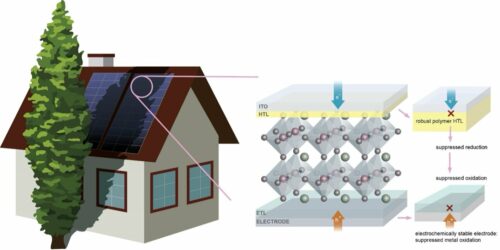University of Washington, University of Colorado Boulder, Rice University, and the University of Oxford researchers have developed a method to enhance the stability of perovskite solar cells under high reverse bias.

Perovskite-based solar cells, known for higher efficiency and lower costs, are nearing commercial use. However, their performance significantly drops under reverse bias conditions, where shaded cells in a solar panel degrade due to reverse voltage from illuminated cells.
A team of researchers from the University of Washington, University of Colorado Boulder, Rice University, and the University of Oxford has introduced a novel method to enhance the stability of perovskite-based solar cells when subjected to high reverse bias. Detailed in their recent publication in Nature Energy, their strategy involves a distinct device structure that merges a polymer hole transport layer with an electrochemically stable back electrode.
Initially, the research team attempted to stabilize perovskite solar cells through a surface passivation technique, which did not yield the desired results. The breakthrough came when Jiang, the paper’s lead author, proposed a new strategy.
The team’s innovative engineering method helps control the electrochemical reactions that cause early degradation of solar cells under reverse bias. This strategy stabilizes the cells even when exposed to relatively high reverse bias.
The researchers developed new p-i-n solar cells using their engineering approach and evaluated their performance. They discovered that these cells remained stable under large reverse voltages, similar to the levels that traditional silicon-based cells can endure.
The team’s encouraging outcomes may inspire other researchers to explore their proposed design strategy. This could lead to advancements in creating more dependable perovskite solar cells that maintain stability under reverse bias conditions.
The recent research conducted by this team could aid in the future commercialization of perovskite-based photovoltaics and enhance the development of other optoelectronic devices. Meanwhile, the team intend to continue their investigations into the mechanisms that lead to the degradation of perovskite cells under conditions of reverse bias and high reverse current.
Reference: Fangyuan Jiang et al, Improved reverse bias stability in p–i–n perovskite solar cells with optimized hole transport materials and less reactive electrodes, Nature Energy (2024). DOI: 10.1038/s41560-024-01600-z












